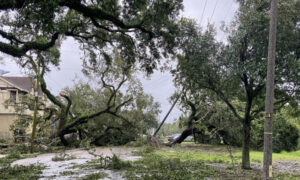 The North Carolina Licensing Board for General Contractors (NCLBGC) is advising citizens to exercise extreme caution to avoid becoming further victimized by scam artists posing as legitimate contractors. The NCLBGC reminds citizens that licensed general contractors have passed an examination, met the financial requirements, and completed continuing education courses required for being a licensed general contractor in the State of North Carolina.
The North Carolina Licensing Board for General Contractors (NCLBGC) is advising citizens to exercise extreme caution to avoid becoming further victimized by scam artists posing as legitimate contractors. The NCLBGC reminds citizens that licensed general contractors have passed an examination, met the financial requirements, and completed continuing education courses required for being a licensed general contractor in the State of North Carolina.
According to the National Oceanic and Atmospheric Administration (NOAA), this year’s hurricane season is expected to be near-normal, which is a change from the previous seven years when above-normal activity was predicted. The outlook for the season indicates a 40% chance of a near-normal season. NOAA anticipates a total of 12 to 17 named storms during the season, with 5 to 9 of them potentially developing into hurricanes. The hurricane season officially runs from June 1st to November 30th, with the peak season typically occurring between August and October.
“We’ve seen that natural disasters lead to an increase in individuals posing as legitimate licensed contractors in an effort to prey upon vulnerable citizens,” said C. Frank Wiesner, Executive Director, NCLBGC. “Individuals who hire unlicensed contractors are putting themselves at great financial risk.”
The NCLBCG reminds North Carolinians of the following:
- Any project quoted at $30,000 or more requires a valid NC general contractors license.
- Projects less than $30,000 do not require a license. However, hiring a NC licensed general contractor may offer security in knowing that you have contracted with a general contractor who is authorized to perform work in NC. Ask for proof that the contractor is licensed. The NCLBGC does not recognize licenses or issued by other states or countries. Citizens can verify if the contractor is properly licensed by 1) searching on the NCLBGC’s website at www.nclbgc.org;
2) calling the NCLBGC at (800) 220-7185; or 3) downloading the Board’s free mobile app for Apple and Android devices by entering “NCLBGC SEARCH” in the search feature.
- Be wary of door-to-door repair solicitations or people who demand deposits or payments in cash.
- Contact your insurance company for guidance before beginning any work. Do not make a large deposit or upfront payment in full. Require a written contract that details the work to be done, materials to be used, a payment schedule that is based on completion of work and a timeline for work to be completed. A licensed general contractor is required to list their license number on all contracts.
- Do not make payments before work specified on the payment schedule is completed.
- Do not make payments for any work not specified in the contract unless it has been submitted and approved in writing by you before the additional work begins.
- Request a Certificate of Insurance from the contractor and verify it is valid by contacting the party who issued it.
- Contact the local permitting office or inspections department to determine if permits are required to assure building code compliance. If permits are required, confirm with the permit office that the contractor has acquired them before construction begins.
- Before making final payment, evaluate the completed work and require the contractor to confirm that all subcontractors and suppliers have been paid to eliminate potential liens on your property.
- Contact local law enforcement if you suspect you are being scammed by a contractor.
- Contact the NC Attorney General’s office if you suspect you are being price gouged by the contractor at https://ncdoj.gov/file-a-complaint/price-gouging/ or call toll free within North Carolina at (877)-5-NO-SCAM or (877)-566-7226.
The NCLBGC is the state agency that issues licenses to approximately 30,000 licensed general contractors in North Carolina. Additional information is available at www.nclbgc.org or by calling (800) 220-7185 or (919) 571-4183.
NWS officials are reminding all residents in Atlantic Coast states to be prepared at home.
In case of a power outage, make sure to have the following emergency items stocked in your home;
- Car charger for cell phones and other devices
- Clean drinking water (recommended 1 gallon per person per day, minimum three days)
- Flashlights
- Batteries: Extra batteries for all of your devices
- Weather radio/clock
- Non-perishable food
- First aid kit
